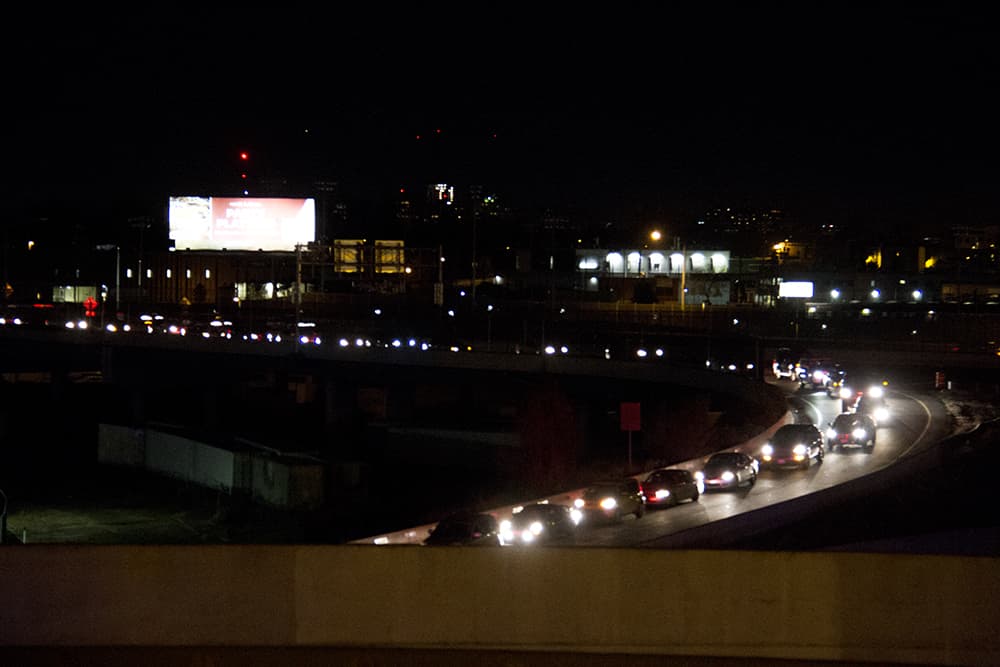
Earlier this week, House Democrats and Senate Republicans -- the leadership anyway -- introduced one of the major pieces of legislation this session: a 0.62 percent sales tax increase that would, if approved by voters, support $3.5 billion in bonding for roads, transit and other transportation needs.
On Friday, Jon Caldara, head of the libertarian-leaning Independence Institute, filed his own ballot measure with the Colorado Legislative Council that calls for $2.5 billion in bonding without the tax increase and without the transit funding. There's enough money in the existing budget to pay for road improvements, he said, and the legislature needs to stop messing around.
"The reason we call it Fix Our Damn Roads is that the proposal we kept hearing -- and it became reality this week -- was that it wasn't just roads. It was all this stuff for transit and a slush fund for cities and all this stuff we don't need," Caldara said.
The measure calls for the state to issue $2.5 billion in bonds for road construction and for the legislature to allocate sufficient funds each year to pay off those bonds. No new taxes. No new fees.
Where will this money come from? Caldara has a go-to list of state spending that he considers wasteful and outside the core services of government: subsidies for movies that film in Colorado, like Quentin Tarantino's "Hateful 8," tax breaks for people who buy electric vehicles, including luxury cars like Teslas, and the Bustang, inter-city bus service.
The measure includes a list of projects that would be funded by this bonding.
In contrast, HB 1242 would raise the sales tax for 20 years by 0.62 percent while reducing vehicle registration fees for a similar length of time. The sales tax increase is estimated to bring in $677 million a year. The bill calls for $50 million a year in existing revenue and $300 million a year in new revenue to support $3.5 billion in bonding capacity -- $1 billion more than "Fix Our Damn Roads." The remaining money would be partially distributed to cities and counties to pay for projects they've already identified as priorities and partially spent on regional multimodal transportation infrastructure.
Caldara said the Independence Institute was working on its own measure anyway, but he sped up the filing when HB 1242 was introduced.
Filing with the Legislative Council is the first step toward getting on the ballot. That office reviews the language of the bill for potential problems and assesses its impact. Sponsors don't have to change their language in response to feedback, but they could. The ballot measure runs on a separate track from legislation. Caldara would need to get enough signatures to get on the ballot.
But the presence of a likely ballot measure that competes with a bill in the legislature for voters' allegiances can influence the legislative process. Tax increases historically have been a tough sell with Colorado voters, while bonding measures have done better. Caldara's solution is similar to the one backed by Republicans in the state House, and Senate Republican leadership has acknowledged the "compromise" legislation will be difficult for many of their members to accept.
At the same time, funding for transit was key to securing Democratic support for the bill. The idea here is that it's all related, and better transit services would lure more drivers off the roads, reducing long-term costs for roads and reducing congestion.
Democrats dispute that there is enough money in the budget to pay for a large bonding measure without drastic cuts in core services, and they've pressed House Republicans to get specific about where all this supposed waste is. At their mid-session report earlier this week, House Minority Leader Rep. Patrick Neville declined to list line items and said what's really needed it a change to the entire budget process.
But specifically on the roads funding measure, Caldara said it's the money for local projects and transit that's pushing up the total cost.
"There are all sorts of things that can be reprioritized. When you strip away the slush fund and the transit stuff, it becomes very obvious they have the means to do it," he said. "If the legislature won't do it, than the people of Colorado will."
Will "damn" be in the formal title language?
"God, I hope so," Caldara said.













